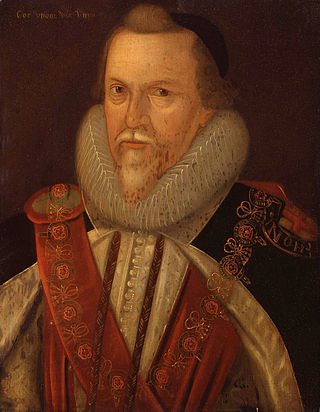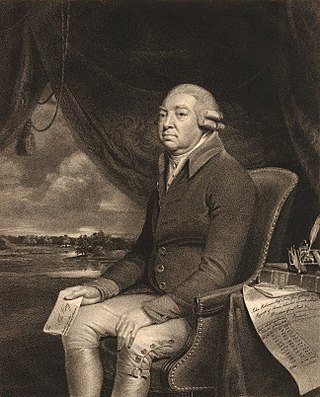Related Research Articles

George Frederick Samuel Robinson, 1st Marquess of Ripon,, styled Viscount Goderich from 1833 to 1859 and known as the Earl of Ripon in 1859 and as the Earl de Grey and Ripon from 1859 to 1871, was a British politician and Viceroy and Governor General of India who served in every Liberal cabinet between 1861 and 1908.

Charles Kemble was a Welsh actor of a prominent theatre family.

Thomas Cecil, 1st Earl of Exeter, KG, known as Lord Burghley from 1598 to 1605, was an English politician, courtier and soldier.

Henry Crabb Robinson was an English lawyer, remembered as a diarist. He took part in founding London University.

Browne Willis was an antiquary, author, numismatist and politician who sat in the House of Commons from 1705 to 1708.
Sir Thomas Wharton, 1st Baron Wharton was an English nobleman and a follower of King Henry VIII of England. He is best known for his victory at Solway Moss on 24 November 1542 for which he was given a barony.

Henry Clifford, 5th Earl of Cumberland was an English landowner and politician who sat in the House of Commons between 1614 and 1622. He was created a baron in 1628 and succeeded to the title Earl of Cumberland in 1641.
John Worthington (1618–1671) was an English academic. He was closely associated with the Cambridge Platonists. He did not in fact publish in the field of philosophy, and is now known mainly as a well-connected diarist.

Dalston is a large village and civil parish within Cumberland unitary authority area, Cumbria, and historically part of Cumberland. It is situated on the B5299 road 4 miles (6 km) south-south-west of Carlisle city centre, and approximately 5 miles (8 km) from Junction 42 of the M6 motorway.
Timothy Halton D.D. (1632?–1704) was an English churchman and academic, Provost of Queen's College, Oxford, from 1677.
Thomas Lancaster was an English Protestant clergyman, Church of Ireland Archbishop of Armagh from 1568.
Richard Marshall D.D. was an English clergyman and academic administrator at the University of Oxford.
Robert Bolton (1697–1763) was an English churchman, dean of Carlisle from 1735.

John Robinson (1727–1802) was an English lawyer, politician and government official.

Henry Stebbing FRS (1799–1883) was an English cleric and man of letters, known as a poet, preacher, and historian. He worked as a literary editor, of books and periodicals.

Joseph Benson was an early English Methodist minister, one of the leaders of the movement during the time of Methodism's founder John Wesley.
George Edward Jelf (1834–1908) was an English churchman and Master of Charterhouse.
William Hutchinson was an English priest in the late 16th and early 17th centuries.

Ralph Brideoake, was an English priest in the 18th century.
Hastings Robinson, (1792–1866), was an English Church of England clergyman and Anglican divine. He was a graduate of Rugby and St. John's College, Cambridge, proceeding M.A. in 1818 and D.D. in 1836, and was a fellow and assistant-tutor at St John's from 1816 to 1827. He held the living of Great Warley from 1827, and was the honorary canon of Rochester from 1862. He was elected F.S.A. in 1824, and edited classical and other works.
References
- ↑ 2he Ejected of 1662 in Cumberland & Westmorland" Nightingale, B p359: Manchester; MUP; 1911
- ↑ Alumni Oxonienses 1500–1714, Riader-Roissie
- ↑
 "Robinson, Henry (1553-1616)". Dictionary of National Biography . London: Smith, Elder & Co. 1885–1900.
"Robinson, Henry (1553-1616)". Dictionary of National Biography . London: Smith, Elder & Co. 1885–1900. - ↑ Horn, Joyce M.; Smith, David M.; Mussett, Patrick (2004), Fasti Ecclesiae Anglicanae 1541–1857, vol. 11, pp. 18–20